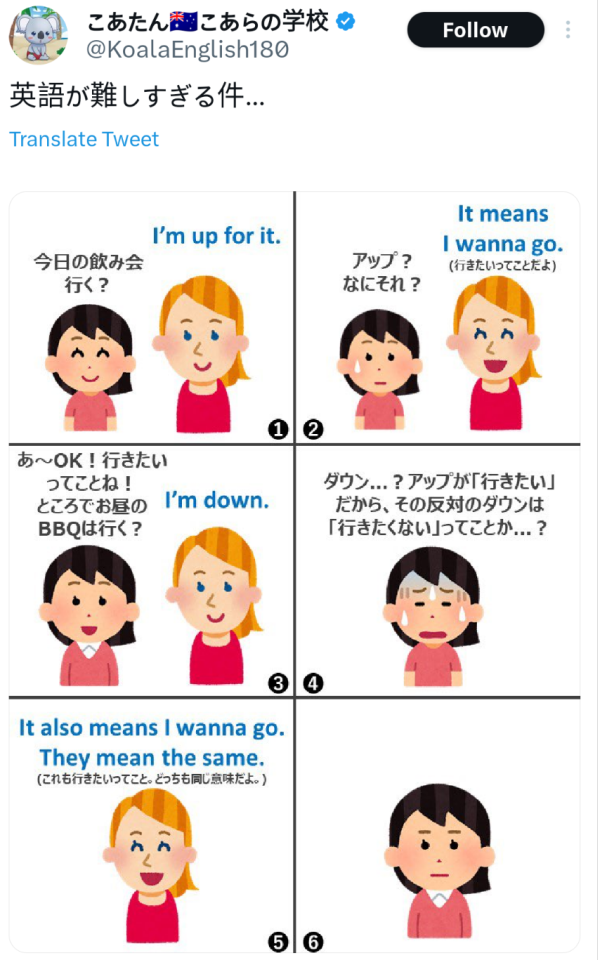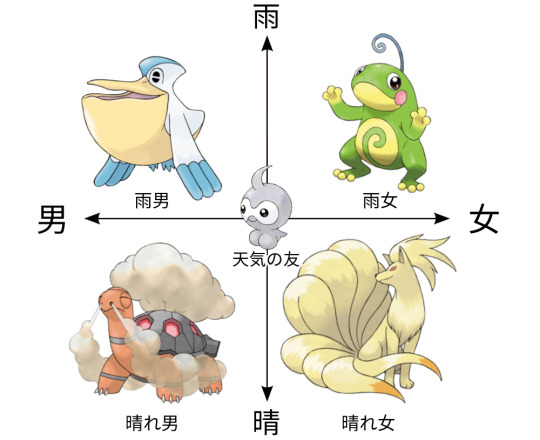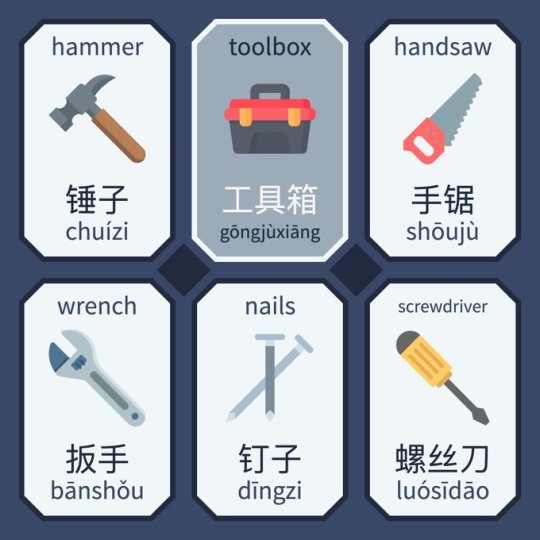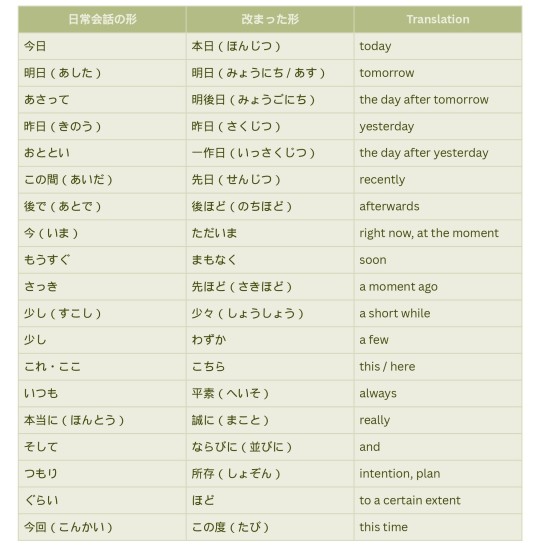#vocabulary learning
Text

🎓 Learn Chinese Online | Learn Mandarin | Chinese Vocabularies
#learn chinese#mandarin#belajar bahasa mandarin#belajar bahasa mandarin pemula#belajar mandarin#chinese language#tumblr#education#language learning#learn chinese online#vocabulary learning#vocabulary#makeup
10 notes
·
View notes
Text

#japanese#learning japanese#japanese vocab#langblog#japan#anime#tumblr language#langblr#manga#japanese vocabulary
20K notes
·
View notes
Text
In my L1-acquisition class two weeks ago, our professor talked about how only 9% of the speech a baby hears is single words. Everything else is phrases and sentences, onslaughts of words and meaning!
Thus, a baby not only has to learn words and their meanings but also learn to segment lots of sounds INTO words. Doyouwantalittlemoresoupyesyoudoyoucutie. Damn.
When she talked about HOW babies learn to segment words our professor said, and I love it, "babies are little statisticians" because when listening to all the sounds, they start understanding what sound is likely to come after another vs which is not.
After discussing lots of experiments done with babies, our professor added something that I already knew somewhere in my brain but didn't know I know: All this knowledge is helpful when learning an L2 as well:
Listen to natives speaking their language. Original speed. Whatever speaker. Whatever topic.
It is NOT about understanding meaning. It is about learning the rhythm of the language, getting a feeling for its sound, the combination of sounds, the melody and the pronunciation.
Just how babies have to learn to identify single words within waves of sounds, so do adults learning a language. It will help immensely with later (more intentional) listening because you're already used to the sound, can already get into the groove of the languge.
Be as brave as a baby.
You don't even have to pay special attention. Just bathe in the sound of your target language. You'll soak it up without even noticing.
#this is not “learn a language while you sleep”#but it is similarly easy#german#langblr#deutsch#learning german#language learning#deutsch lernen#german language#german learning#german vocabulary#language
3K notes
·
View notes
Text
hey since ASAB terms are sort of becoming the next "biological (fe)male". reminder that ASAB terms simply describe what was observed and assigned by someone else when you were born. It is/was your Legal Sex. not everyone who was AMAB is a "biological male". or vice versa.
use more terms that don't exclude people! say perisex/dyadic! there's even alternative single-word terms that mean "biological (fe)male!": say müllerian! say wolffian!
expand your queer vocabulary to better describe various experiences!!! synonyms exist for a reason!! just start Looking Shit Up I promise it's so much fun! I love learning!!!!!!
#obligatory We Are Not Intersex for this post#well. as far as we're aware anyway#we just recently learned müllerian and wolffian exist#and I think I would like to include intersex folks more in my vocabulary#also because those words scratch my brain /pos#intersex#queer#transgender#lgbtqia#lgbtq#mild take? maybe?
987 notes
·
View notes
Text
接続詞(せつぞくし)
conjunctions - words that are used to link phrases together
情報を加える // Adding information:
しかも besides
そのうえ moreover, on top of that
さらに moreover, on top of that
そればかりか not only that, but also...
そればかりでなく not only that, but also...
情報を対比する // Putting into contrast:
それに対して in contrast
一方 whereas
他の可能性・選択肢を言う // Giving alternatives:
あるいは or perhaps (presenting another possibility)
それとも or (presenting another option within a question)
結論を出す// Drawing a conclusion:
そのため for that reason
したがって therefore
そこで for that reason (I went ahead and did...)
すると thereupon (having done that triggered sth. to happen)
このように with this (adjusting a conclusion to the arguments given beforehand)
こうして in this way
理由を言う // Giving a reason:
なぜなら...からだ the reason is
というのは...からだ the reason is
逆説を表現する // Expressing a contradiction:
だが however, yet, nevertheless (contradicting what one would have expected)
ところが even so (spilling a surprising truth)
それなのに despite this, still
それでも but still (despite a certain fact, nothing changes)
説明を補う // Amending one's explanation:
つまり that is, in other words (saying the same thing using different words)
いわば so to speak (making a comparison)
要するに to sum up, in short
説明を修正する // Revising one's explanation:
ただし however (adding an exception to the information stated beforehand)
ただ only, however
もっとも however (obviating any expectations that might arise through the previous statement)
なお in addition, note that (adding supplementary information)
話題を変える // Changing the subject:
さて well, now, then (common in business letters after the introductory sentence; is often ignored in tranlations)
ところで by the way
#文法#grammar#conjunctions#japanese grammar#jlpt n2#japanese langblr#japanese language#language#japan#japanese#japanese vocabulary#langblr#linguistics#studyblr#study blog#studyspo#study motivation#study aesthetic#study notes#learning japanese#nihongo#日本語#日本語の勉強#light academia#light acadamia aesthetic
710 notes
·
View notes
Text
Today I learned about the following Japanese words
晴れ女 (はれおんな), a woman who causes the weather to become sunny when she goes out
晴れ男 (はれおとこ), a man who causes the weather to become sunny when he goes out
雨女 (あめおんな), a woman whose presence causes rain
雨男 (あめおとこ), a man whose presence causes rain
I decided to create a fifth one:
天気の友 (てんきのとも), your nonbinary friend who is always prepared for whatever weather they might face. Rain coat, mittens, zip-off pants, you name it. They're prepared.
For illustrative purposes:

#meme#japanese language#pokemon#pokemon meme#politoed#ninetales#castform#torkoal#pelipper#learn japanese#language learning#japanese vocabulary#ポケモン
410 notes
·
View notes
Text
ancient greek words for colors:
On the whole, the Greeks were not really concerned with giving names to specific colors. Their color terms were vague, often had more to do with shade than color difference, and drew in a sort of dynamic physicality that is honestly incredibly interesting.
μέλας and λευκός, which were commonly used to refer to black and white respectively, were still more involved with shade than the particular colors that we perceive as black and white. μέλας also meant dark, murky, and swarthy. λευκός was light, bright and clear, referred to any white color from a pure white to a light grey, and could also refer to someone with lighter skin.
χλωρός meant pale green or greenish yellow, but also commonly meant pale or pallid when referring to people and fresh or blooming when referring to plants and liquids (including blood and tears).
πορφύρεος is where we get the color term purple. And when it was referring to clothes or things, it did mean purple. But when it was describing people, especially their complexions, it meant bright red or flushed. This definition originates from the basic meaning of the word: heaving, surging, gushing, coming from the verb πορφύρω.
ξανθός and ἐρυθρός are perhaps the only straightforward terms, meaning yellow or golden and red respectively. ξανθός was typically used to describe blonde (ish) people; Achilles is described as having ξανθή κόμη (golden hair).
γλαυκός was commonly used to refer to the color grey, or simply to describe something as gleaming. When it refers to eyes, it usually describes the color; the most famous example being Athena and her epithet of γλαυκῶπις or grey-eyed (or gleaming eyed).
And now let's talk about κυάνεος. We get the color term cyan from it, and the word is popularly considered to refer to a dark blue. But that isn't exactly accurate. If we look at what this word typically described: hair, people, etc., it is clear that the concept of blue that we have nowadays wasn’t really coming into play. In fact, the more general translation is dark or black, conveying a shade rather than a color, like μέλας. If I were to attribute a color term to this word at all, I would probably say blue-black, or a cool black, to convey the depth of that shade, which is probably what the Greeks were describing.
#ancient greek#vocab#vocabulary#language learning#greek language#greek vocab#classical literature#classics#colors#words for colors#how to describe colors#dys blurbs#i had to make my own list because every other one i've seen has colors that aren't referred to by texts with as much frequency#achilles#athena#the iliad#the odyssey
535 notes
·
View notes
Text
One-Page Masterlist
안녕하세요! Hey everyone! I recently got an ask about my old masterlist, which is the same as my broken-down masterlist except it has all of my lessons on one page, rather than on multiple separate posts. Some may find this expanded version easier to navigate, so I’ll keep this up for y’all! My broken-up masterlist, of course, will still be available for those who find that more helpful :)
Hangul Lessons
Consonants
Vowels
Writing/Reading Korean Syllables
Some 받침 Rules
Diphthongs
Stroke Order
Some More 받침 Rules
Irregular Verbs
The Basics
Common Phrases
Numbers
Sino-Korean vs. Native Korean Numbers (Instagram Post)
Sentence Structure and Particles
Present-Tense Conjugations and Formal Language
Adjectives
Questions
Honorifics and Casual Language
Beginner
Negative Sentences
잘 and 못
Past Tense
Future Tense (-ㄹ / 을 것이다)
-ㄹ / 을 까요? (Shall we…? / I wonder…?)
-(으)세요 (Giving Commands / Asking Questions)
Telling Time
-고 싶다 (I want to…)
How to Say “And”
-지만 (However)
아/어/여서 (So…)
Negative Commands
Spacing (띄어쓰기)
Adverbs
ㅂ Irregular
Comparatives and Superlatives
난, 날, & 내가
Upper-Beginner
-(으)면 (If…)
아/어/여도 (Even though…/Even if…)
(으)면 되다 / 아/어/여도 되다 (I can…/You may…)
-아/어도 되다: Asking for and Giving Permission (Instagram post)
-(으)면 되다 & -(으)면 안 되다 (Instagram post)
아/어/여야 되다 and 아/어/여야 하다(Have to / Should)
Present Progressive (-고 있다)
How to Say “Or”
-아/어/여하다
All About 중
How to Use -(으)로
Before & After
-ㄴ/은 채로
Intermediate
Describing Nouns with Verbs (-는 것)
Describing Nouns with Verbs - Past & Future Tense (-ㄴ/은 / -ㄹ/을 것)
Nominalization
것 같다 (I think… / It seems…)
-러 가다 / -러 오다
-(으)려고 (In order to…)
-기로 하다 (to Decide to do Smth)
척하다 (To Pretend)
-게 되다
-군요 / -구나
아/어/여 보다 (to try…)
-은/ㄴ 적 있다 / 없다 (I have / have not)
-ㄹ/을 게요 (Future Tense)
겠다
-ㄹ/을 수 있다/없다 (I can / cannot)
-ㄹ/을 때 (When…)
-ㄴ/는다면 (If)
-(으)면서 and -(으)며
-(으)니까 (Because / So)
-아/어/여주다
-(ㄴ/는)다 (Narrative Form)
Quoting
Let’s…
Quoting continued
(으)ㄹ래요? (Wanna…?)
-죠
-대로
More Quoting - 대 & 래
잘하다 & 못하다 vs. 잘 하다 & 못 하다
-아/어 가지고
-(으)려면
-는 길에 & -는 길이다
-(으)면 vs. -ㄴ/는다면 (Instagram Post)
-았/었을 것이다
-느라고
-는 데(에)
-ㄹ/을 뻔하다
Upper-Intermediate
-ㄴ/는데
-(으)ㄴ/는지 (Whether or not)
-(이)라는…
All About 아무리
-잖아요
Expressing Surprise
-시 (Honorific)
Making Comparisons
-아/어/여지다
I might…
So that…/To the point where…
Causative Verbs
시키다
Passive Verbs (part 1)
Passive Verbs (part 2)
-ㄴ/은가 보다 & -나 보다 (I guess…)
-ㄹ/을수록
Other Meanings of 싶다
-자마자 & -는 대로(As soon as…)
-긴 하다
-치고
-김에
차라리 (Rather)
-(으)ㅁ Nominalization
-기는 무슨 & -기는 개뿔
-고 보니까
-듯(이)
버리다
-(으)면 좋겠다 & -(으)면 하다
-길 바라다
Advanced
-거든(요)
-줄 알다/모르다
-ㄹ/을 테니까 and -ㄹ/을 텐데
-았/었던
아니라 and 대신에
-ㄹ/을 리가 없다
편이다, 별로, and More
-지 그렇다 (Why don’t you…?)
-ㄹ/을 걸
-ㄹ/을 까 보다
-다면서요
-다니 part 1
-다니 part 2
뜻이다 & 말이다
-다가
-더라고(요)
-더니
Some colloquialisms: 아니시에이팅 and 뭐 이렇게
-(으)ㅁ Sentence Ending
-다 보니까
What does 따위 mean?
-ㄴ/는데도
Korean Idioms
Vocabulary
Must-Know People
Must-Know Places
Must-Know Things
Must-Know Verbs
Must-Know Adjectives
Countries
Months, Days of the Week, and More
Clothing (옷)
School (학교)
Autumn (가을)
Autumn (w/Pictures!)
More Questions
House / Apartment (집 / 아파트)
Emotions / Feelings ( 감정)
Animals (동물)
Loan / Konglish Words
Food and Drink (먹을 것과 마실 것)
Parts of the Body (몸)
Counters
Modes of Transportation (교통 수단)
Colors (색깔)
Colors (with Pictures!)
Weather (날씨)
Winter (겨울)
Music & Instruments (음악과 악기)
Baking Gingerbread Cookies
Emergency (비상)
Hygiene & Bathroom (위생 & 화장실)
Indefinite Pronouns
Work / Office (일 / 사무실)
Spring (봄)
Coronavirus Prevention (코로나바이러스 방역)
How to Wash Your Hands (손을 씻기)
Time (시간)
Korean Cuisine (한식)
Summer (여름)
Summer (여름) w/Pictures!
Graduation (졸업)
Identity (독자성)
Korean Text Slang
Similar Words
Makeup w/Pictures! (화장품)
Family (with Pictures!)
Pronouns
How to Say “Still” and “Already” in Korean
Tastes & Textures (맛과 질감)
K-Pop Audition
K-Pop Fandom Terminology
Different Ways to Say “Change”
Flower Names
What Does 원래 Mean?
What does 오히려 Mean?
College
Hanja Lessons
최
수
악
식
급
동
부 & 불
애
출
퇴
예
음
중
학
습
연
생
대
입
인
문
감
과
원
특
만
후
무
Charts
Present, Past, and Future Tense
Question Words
잘 vs. 못 and Negative Conjugations
Future Tenses
-았/었던 vs. -던 (at end of lesson)
Particles
Some 받침 Rules
Gifving Commands
Conjunctions and -아/어/여서 vs. -(으)니까
-(으)면 vs. -다/라면 and Different Ways to Say “And”
How to Say “Or” (at end of lesson)
Telling Time (at end of lesson)
Comparatives and Superlatives
잘하다 & 못하다 vs. 잘 하다 & 못 하다 (at end of lesson)
Comparing 잘하다/못하다, 잘 하다/못 하다, & 수 있다/수 없다
Irregular Verbs
Pop Quizzes
Level 1
K-Pop Breakdowns
TXT - “Cat & Dog”
Twice - “Feel Special”
Enhypen - “Fever”
2NE1 - “Go Away”
Lee Hi - “Only”
“기억을 걷는 시간 (Time Spent Walking Through Memories)”
KCM - “An Old Love Story (흑백사진)”
Taeyeon - “Can’t Control Myself”
Epik High - “Lost One”
Colde - “A Song Nobody Knows”
IU - “My Sea”
Enhypen - “Polaroid Love”
유라 (youra) - “하양 (RAL 9002)″
BTS - “Ddaeng”
Stray Kids - “For You”
Woozie - “어떤 미래 (What Kind of Future)
TXT - “Eternally”
LOONA - “Heart Attack”
Stray Kids - “Muddy Water”
LOONA - “Girl Front”
Pentagon - “Daisy”
BTS - “Sea”
Semester in SK
Nami Island (남이섬)
Things to Buy at Daiso
Shopping Phrases
Ordering Coffee
Signs in Korea
Ordering at a Restaurant
Riding the Seoul Subway
Things at the 편의점
Korean Curse Words
Etiquette in South Korea
Drinking Culture
Hanja in Real Life
Holidays in South Korea
Korean Cuisine
Concert Ticketing in South Korea
K-pop Comebacks in Korea
Summer in South Korea
What I Learned
#korean#korean language#hangul#korean grammar#korean vocab#korean vocabulary#learn korean#learning korean#langblr#Korean langblr#masterlist#apok#apopofkorean#study korean#studying korean#kpop#kpop lyrics#basic korean#beginner korean#intermediate korean#advanced korean#hanja#한국어#한글#한자#한국어 공부하기#한국어 배우기#한국어 문법#한국어 어휘#초급 한국어
2K notes
·
View notes
Text
I love how everyone has Lucifer calling Al Bambi as an insult, but guys-
Bambi was released in 1942. Alastor died in the 1930's. He has no fucking clue who or what Bambi is and he definitely would've never learned with his aversion to television.
He keeps getting called Bambi and is able to reason that it's an insult and so he reacts appropriately, but doesn't actually know what he's being called.
This shit is hilarious to me for whatever reason.
#the equivalent of learning your vocabulary from reading#you know the word and you know how it works and when to use it#but you can't actually define it#lucifer#lucifer morningstar#hazbin hotel#alastor hazbin hotel#alastor the radio demon#hazbin alastor#the radio demon#alastor headcanons#hazbin hotel headcanon#alastor#radioapple#bambi
228 notes
·
View notes
Text
Basic quantifiers in Japanese
台 (だい) - used for cars, bicycles, machines, mechanical devices, household appliances
杯 (はい) - used for cups and glasses
匹 (ひき) - used for small animals
本 (ほん) - used for long and thin objects
階 (かい) - used for floors
回 (かい) - used for occurrences, numer of times
個 (こ) - used for things that are small and round
枚 (まい) - used for thin and flat objects
人 (にん) - used for people (but we say 一人 (ひとり) for one person and 二人(ふたり)for two
冊 (さつ) - used for books
歳 (さい) - used for age
Plus general quantifiers:
一つ (ひとつ)
二つ (ふたつ)
三つ (みっつ)
四つ (よっつ)
五つ (いつつ)
六つ (むっつ)
七つ (ななつ)
八つ (やっつ)
九つ (ここのつ)
十 (とお)
#japanese#langblr#japanese langblr#vocabulary#japanese language#studyblr#japanese vocabulary#food vocabulary#vocabulary list#learning japanese#mine
830 notes
·
View notes
Text

🎓 Learn Chinese Online | Learn Mandarin | Chinese Vocabularies
#learn chinese#mandarin#belajar bahasa mandarin#belajar bahasa mandarin pemula#belajar mandarin#chinese language#education#language learning#learn chinese online#tumblr#tumblr today#today on tumblr#usa today#learning#vocabulary learning#vocabulary#chinese vocabulary
9 notes
·
View notes
Text

#japanese#learning japanese#japanese vocab#langblog#japan#langblr#manga#japanese vocabulary#anime#tumblr language
264 notes
·
View notes
Text

No one should be surprised at me drawing this.
Thank you for your time.
#fan art#fire emblem#listen I just think Soren should be happy#also learning in my playthrough that ike has a huge vocabulary wtf#anyway the lil guy deserves a nice life with his hunky bf#thank you for coming to my ted talk
512 notes
·
View notes
Text
I think, broken down to its essence, learning a language can have three stages/goals, which can but needn't all be reached:
- Goal 1: have enough vocab and grammar to say stuff and have your message be understood
- Goal 2: have the grammar and vocab to say grammatically correct sentences
- Goal 3: be able to do creative/academic writing (meaning: have the skill+vocab to vary writing style according to the text type)
#this is probably also part of where that fluency discourse comes from#(besides fluency being super subjective in general)#because: is goal 2 already fluent?#or do you need the versatility of goal 3 to really consider yourself fluent?#german#langblr#deutsch#learning german#language learning#deutsch lernen#german language#german learning#language#german vocabulary
208 notes
·
View notes
Text
please reblog for a larger sample size、あれがとう!!
#japanese#learning japanese#japanese vocabulary#hiragana#japan#日本語#日本#lemme be happy with my kanji practice hwbeb#okay pls voteeee#naruto
239 notes
·
View notes
Text
改まった形|Polite Forms
In formal settings like in a business meeting or at a public gathering some words are switched with politer forms. You often hear them when somebody is giving a speech, holding a presentation or on TV. But they appear in written form as well, especially in business context. Basically, everywhere where keigo is used, it is also expected to apply politer forms.

#文法#敬語#japanese langblr#langblr#studyblr#study movitation#learning japanese#japanese vocabulary#japan#japanese#study blog#study notes#language blog#keigo#japanese studyblr#japanese grammar#japanese language#日本語#日本語の勉強#nihongo
237 notes
·
View notes